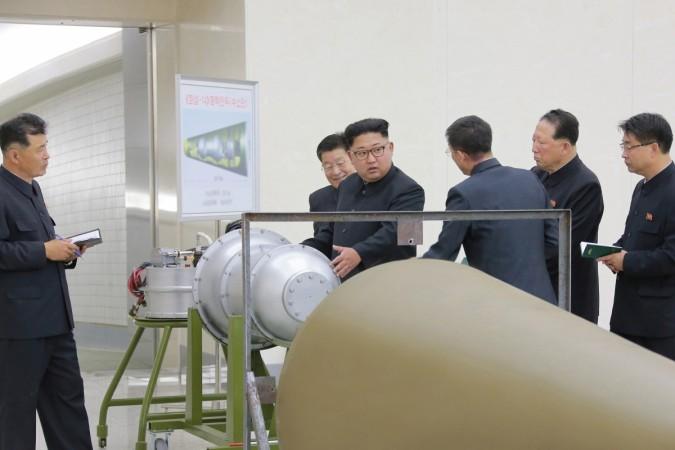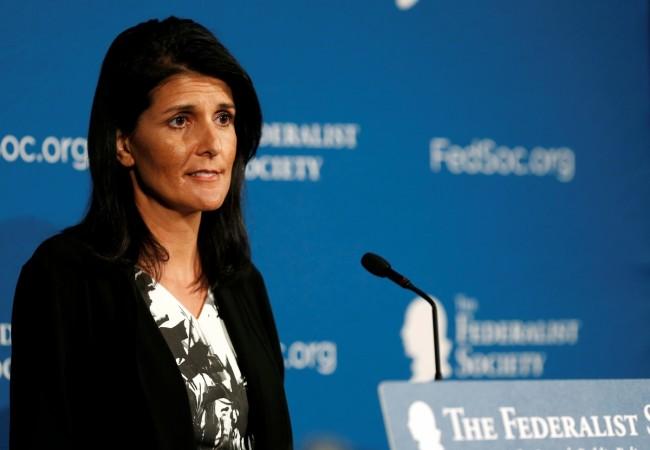While North Korea may be boasting about its nuclear weapons programme and testing one bomb after the other, irking many nations across the world, it looks like a war may not be the only concern. In fact, the mountain under which the recluse nation carries out these tests may be at the risk of collapsing, a Chinese scientist said.
Even though the country has not really specified which mountain it has been carrying these tests under, researchers at the University of Science and Technology of China in Hefei, Anhui province, have reportedly measured and studied the earthquakes that are a result of these nuclear tests and believe that these are all being carried out under the same mountain.
And if the mountain does collapse, as believed by these experts, it could result in some major distress to the environment. One more test and a part of the mountain could cave in resulting in a hole, through which harmful nuclear radiations could spread to the entire region.
"We call it 'taking the roof off'. If the mountain collapses and the hole is exposed, it will let out many bad things," Wang Naiyan, the former chairman of the China Nuclear Society and senior researcher on China's nuclear weapons programme, told the South China Morning Post.
Speaking about the tests and sites suitable for it, Wang said that nuclear tests can be carried out efficiently on those mountains that have a high peak and a much flatter slope. "If the bombs were planted at the bottom of vertically drilled tunnels, the explosion would do less damage," he said.

Wang explained that the increasing size of the bombs have also been increasing the risk of the mountain collapsing. "A 100 kiloton bomb is a relatively large bomb. The North Korean government should stop the tests as they pose a huge threat not only to North Korea but to other countries, especially China," Wang explained.
However, he did explain that the studies may not be 100 percent accurate as seismic waves travel at different speeds through different rocks and an exact prediction is difficult.
The Hydrogen bomb that Pyongyang tested on Sunday, September 3, has not gone down well with quite a few nations, who have raised concerns over North Korea's blooming nuclear programme. The bomb, which is said to be five times more powerful than the atom bomb dropped by the US on Hiroshima, resulted in a 6.3 magnitude earthquake in North Korea's mountainous region and another 4.1 tremor.
Numerous head of states have expressed concerns over this tests and the US has been especially displeased as Pyongyang had earlier threatened to land missiles near the American territory of Guam. Post the threat and the Hydrogen bomb test, US President Donald Trump said: "all options were on the table," and that a decision on Pyongyang would be taken soon. When a reporter asked the US president if the US would consider attacking North Korea, he said: "We'll see," according to Slate.
"The world has received North Korea's latest message loud and clear: this regime has signaled its contempt for its neighbors, for all members of the United Nations, and for minimum standards of acceptable international behavior," Trump said in a statement released by the White House.
Dialogue pointless, sanctions are the way to go?
Additionally, the US envoy to the United Nations also explained that the US doesn't want war but Pyongyang has been testing its patience. Nikki Haley told a Security Council meeting in New York that the US' patience was "not unlimited" and that North Korea had been "begging for war," reported BBC.

Meanwhile, many leaders have called for a dialogue with North Korea and its leader Kim Jong-un. "I think it really is time for dialogue. We are ready to offer our role for good services as a mediator. I think in the upcoming weeks a lot will depend on how the US and China can have an influence in this crisis," explained Swiss President Doris Leuthard.
However, Haley believes that dialogues will have no effect on the recluse nation and very strong sanctions are the only way to go.
The US risking its relations with South Korea
While the US and South Korea have been allies for decades, Pyongyang's nuclear tests have also managed to drive a wedge between Washington and Seoul. South Korean president Moon Jae-in has been urging Trump to hold talks with Jong-un, but Trump has been livid tweeting: "Talking is not the answer." Not just that he has even threatened to pull out from the five-year-old free trade agreement with Seoul.
South Korea is finding, as I have told them, that their talk of appeasement with North Korea will not work, they only understand one thing!
— Donald J. Trump (@realDonaldTrump) September 3, 2017
He later also tweeted: "The United States is considering, in addition to other options, stopping all trade with any country doing business with North Korea."
The United States is considering, in addition to other options, stopping all trade with any country doing business with North Korea.
— Donald J. Trump (@realDonaldTrump) September 3, 2017
Post Trump's statement, Jae-in explained that the issue must be resolved peacefully and his office said: "We can never tolerate another catastrophic war on this land. We will not give up our goal of working together with allies to seek a peaceful denuclearization of the Korean Peninsula," reported the New York Times.
















